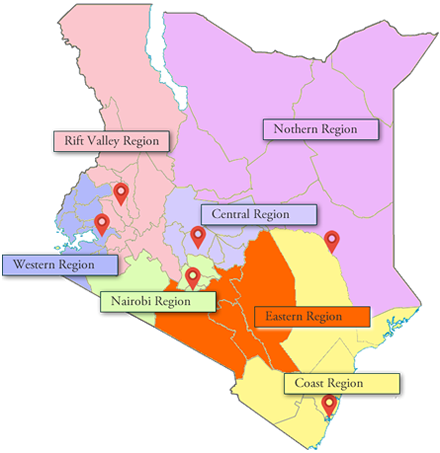LEVEL OF COUNTERFEITING IN URBAN KENYA (ACA)
The Anti-counterfeit Act, 2008 defines counterfeiting to include; the manufacturing, production, packaging, re-packaging, labeling or making of protected goods whereby those protected goods are imitated. Simply, it’s the violation of trademarks, industrial designs, and geographical indications, copyright and related rights. The intent is to confuse or deceive consumers as to their quality, source, origin or legitimacy. Counterfeiting is a billion-dollar industry which is widespread and rampant throughout the world but more so among low-income economies like Kenya. Counterfeit products are becoming a major problem to Manufacturers, consumers, innovators and traders in Kenya and the global market.
The study was carried out by the Anti-Counterfeit Agency in the year 2016 with the aim of providing data on the counterfeiting trends in urban Kenya. Such data will inform policies on anti-counterfeiting measures and form a benchmark upon which impact can be assessed.
Teams composed of research assistants and supervisors collected data from 401 manufacturers from Nairobi, Mombasa, Kisumu, Eldoret, Nakuru and their environs. Structured questionnaires were used to obtain qualitative and quantitative data. Statistical Package for Social Sciences (SPSS) computer program was used to enter, clean and analyze quantitative data while content analysis was employed to analyze qualitative data. The findings were presented using basic frequency charts, ratios and comparisons.
Findings on counterfeiting activity targeting manufacturer goods showed that for both local and imported goods, 56% of manufacturers were aware of counterfeiting activity targeting their products, 33% were not aware and 11% did not know of any activities. From the manufacturers who were able to estimate the trend of counterfeiting in the country, 82% said it was increasing, 8% thought the trend is constant, 8% said it was decreasing and 2% didn’t know anything about the trend of counterfeiting. 46% of manufacturers said that counterfeit goods are locally manufactured, 35% said they are imported while 19% said they are both imported and locally made. 37% of manufacturers work with the government bodies in fighting counterfeit trade, while 63% don’t. 60% of the manufacturers maintain a supply chain management with their retailers and resellers while 40% do not. From the manufacturers and suppliers who were able to estimate the market value of their products being counterfeited, the level of counterfeiting in urban Kenya stood at 23.86% as at December 2015.
The rampancy of this counterfeit trade and the rapidness of its growth are fueled by a number of factors ranging from limited supply of genuine products, inability to identify the original products, high prices of the original products, poverty, corruption and ignorance of the populace. The recent entirety removal of import restrictions and controls, digital technology, globalization and trade liberalization policies has also been associated with increased counterfeit products in the market.
The consequences of counterfeit trade include; increasing corruption, discouraging investors, closure of businesses, evasion of tax, poor quality of products, health risks, environmental hazards, loss to the economy, unemployment and low production.
Policy Recommendations
- Manufacturers to work together with various government bodies to fight counterfeiting in the Kenyan market.
- Anti-Counterfeit Agency, together with manufacturers and supply chain agents should enhance their awareness creation activities and work on reducing the level of counterfeiting in the country. This also includes national campaigns to create awareness on the existence and identification of counterfeit goods.
- Manufacturers should be educated on the importance of product protection by way of registration of their intellectual property rights.
- Manufacturers should be encouraged to maintain a supply chain management with their retailers and resellers, to help counter the menace of counterfeiting.
- An IT-based solution should be developed to help consumers identify counterfeit goods.
- The Agency together with other government bodies should enforce strict laws at the entry points and also have automated verification systems.



